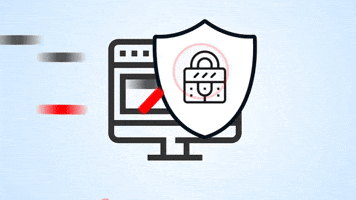Digital security has become a priority for businesses of all sizes. With the constant growth of cyber threats, relying solely on traditional methods is no longer enough.
Artificial intelligence has emerged as a powerful ally in protecting data, networks, and systems. Through advanced algorithms, AI can identify suspicious patterns, prevent attacks, and respond to incidents more quickly.

In this article, you'll discover 5 AI solutions for enterprise cybersecurity that are transforming the industry. Learn how to protect your business more efficiently, with technology and intelligence!
How Artificial Intelligence is Changing Cybersecurity in Companies
Cybersecurity has always been a central concern for businesses, but the exponential growth of data, connected devices, and sophisticated attacks has increased the complexity of this challenge.
Understanding how AI is used in cybersecurity is key to keeping up with this transformation. This technology is becoming essential for strengthening digital protection in a more proactive and efficient way.
Unlike traditional solutions that rely on fixed rules and manual reactions, AI can learn from data and adapt its responses in real time.
Machine learning algorithms and neural networks analyze behavior, identify anomalies, and recognize patterns that indicate potential threats—often before they even materialize.
Additionally, AI automates tasks that would require hours of human analysis, such as event correlation, false positive verification, and incident response.
This frees up security teams to work more strategically, reducing response times and minimizing the impact of cyberattacks, while also strengthening the secure use of these systems.
With the growing use of AI in corporate environments, it’s also increasingly important to understand the areas that require attention. In this article about AI assistant security, we explain how to strengthen the protection of these technologies and avoid vulnerabilities.
By incorporating intelligent automation into cybersecurity, companies can act preventively, scalably, and more resiliently—even in the face of increasingly complex attacks.
This new defense model has become a competitive advantage for businesses that value security, continuity, and digital trust.
Advantages of AI Compared to Traditional Security Solutions
AI for enterprise cybersecurity has proven to be a more effective alternative in the face of increasingly sophisticated threats.
Traditional cybersecurity solutions—such as signature-based antivirus software, firewalls, and manual detection systems—are still used by many companies.
However, as attacks become more complex, these approaches alone are no longer sufficient. This is where artificial intelligence truly stands out.
While traditional methods rely on predefined rules and manual updates to recognize threats, AI uses continuous learning to detect unusual patterns in real time, even when dealing with previously unknown (zero-day) attacks.
This means it doesn’t rely solely on known threat databases, as is the case with conventional antivirus software.
Another strong point is automated response. AI can isolate suspicious behavior, stop malicious processes, and alert security teams more quickly and accurately, reducing average response time and the overall impact of an attack.

Conventional solutions, on the other hand, tend to be reactive and slower, often requiring human analysis and action.
Moreover, AI tools can correlate data from different sources — such as emails, endpoints, networks, and the cloud — to generate more accurate insights and alerts, reducing the number of false positives and prioritizing real risks.
This improves the productivity of IT teams and avoids wasting time on irrelevant alerts.
Finally, while traditional strategies often require manual configurations and constant updates, AI cybersecurity solutions evolve automatically, learning from each new incident and becoming more efficient over time.
However, this continuous learning process also requires attention. To ensure AI systems deliver safe and reliable responses, it’s essential to apply best practices, as we explain in this article on how to prevent AI hallucinations.
5 AI Tools to Protect Your Business from Cyber Threats
Below, we present some of the most recognized AI-based cybersecurity tools on the market.
These five software solutions operate with intelligent automation to monitor, detect, and respond to threats quickly and accurately.
1. Darktrace – Autonomous Detection with Immediate Response
Darktrace uses AI to analyze normal network behavior and automatically identify any unusual activity.
With its autonomous defense system, the platform can react in real time to contain threats before they spread.
🔑 Benefits:
- Detects internal and external attacks without predefined rules
- Operates autonomously, even without human intervention
- Protects networks, cloud environments, and IoT devices
2. CrowdStrike Falcon – Predictive Endpoint Protection
Focused on protecting devices such as laptops and servers, CrowdStrike Falcon uses machine learning and behavioral analysis to anticipate and block attacks before infection occurs.
🔑 Benefits:
- Prevention against ransomware, malware, and advanced threats
- Continuous updates based on large data volumes
- Real-time analysis with no impact on device performance
3. IBM Security QRadar – Centralized Threat Intelligence
QRadar is a SIEM (Security Information and Event Management) platform that integrates AI to correlate security events and identify complex attacks more accurately.
🔑 Benefits:
- Detects threats difficult to identify with traditional methods
- Reduces false positives and prioritizes the most critical alerts
- Aids decision-making with intelligent dashboards
4. Palo Alto Networks Cortex XDR – Intelligent Threat Response
Cortex XDR combines data from multiple sources to provide a unified security view, using AI to detect suspicious behavior and neutralize attacks in real time.
🔑 Benefits:
- Integrated view of endpoints, networks, and the cloud
- Automated response with immediate corrective actions
- Shortens investigation and incident resolution time
5. Microsoft Defender for Endpoint – Smart Security with Full Integration
Microsoft’s solution offers robust protection with AI applied to device security, natively integrating with the Microsoft 365 ecosystem.
🔑 Benefits:
- Automatic detection and response to threats
- Integration with other productivity and security tools
- Cloud-based protection with Microsoft’s global intelligence
🔗Explore Microsoft Defender for Endpoint
These solutions demonstrate how artificial intelligence is reshaping the way companies face digital threats — in a faster, smarter, and more proactive way.

AI or Traditional Approach: What Makes More Sense for Your Company?
With so many innovations in the cybersecurity market, a common question arises: should companies completely replace their conventional approaches with AI-based technologies?
The answer, as in many cases, depends on the context and business objectives.
The main advantage of AI is its ability to adapt and automate.
While traditional approaches require manual actions, constant updates, and often struggle to keep up with unknown threats, AI-based tools continuously learn from the environment, anticipating malicious behavior and reacting in real time.
On the other hand, traditional approaches still hold value—especially in highly regulated environments or those with low digital maturity.
In such cases, firewalls, signature-based antivirus programs, and other reactive measures still play an important role in initial protection.
For many companies, the best choice isn’t to go with one approach over the other, but rather to combine both models.
Integrating conventional systems with intelligent mechanisms provides more robust coverage, balancing operational efficiency with human oversight and compliance.
Therefore, if your company is seeking faster responses, proactive detection, and risk reduction, adopting AI solutions can represent a significant step forward.
And the greater the volume of data and complexity of operations, the more positive the impact this intelligent technology tends to have on your digital security strategy.
🔍 Conclusion: AI Is the Future of Enterprise Cybersecurity
Today’s digital landscape demands more than reactive solutions.
With increasingly complex and persistent threats, artificial intelligence is becoming an essential ally for companies looking to protect their data, systems, and operations in a fast and effective way.
As we’ve seen in this article, AI cybersecurity tools offer benefits such as automation, real-time detection, proactive response, and continuous learning.
While traditional approaches still play a role, combining them with intelligent technologies can significantly enhance an organization’s level of protection.
Whether to anticipate threats, reduce risks, or gain operational efficiency, investing in cybersecurity with intelligent technology is a strategic—and increasingly inevitable—decision.
🚀 How Darwin AI Can Support Your Journey with Artificial Intelligence
Artificial intelligence is transforming not only cybersecurity but also the way companies communicate, operate, and grow.
Darwin’s AI employees develop smart solutions that automate processes, optimize workflows, and enhance customer experience across multiple touchpoints.
If you want to explore the potential of AI to make your company more efficient, connected, and future-ready, talk to our specialists and discover how technology can boost your results with intelligence and agility.
.png)





















